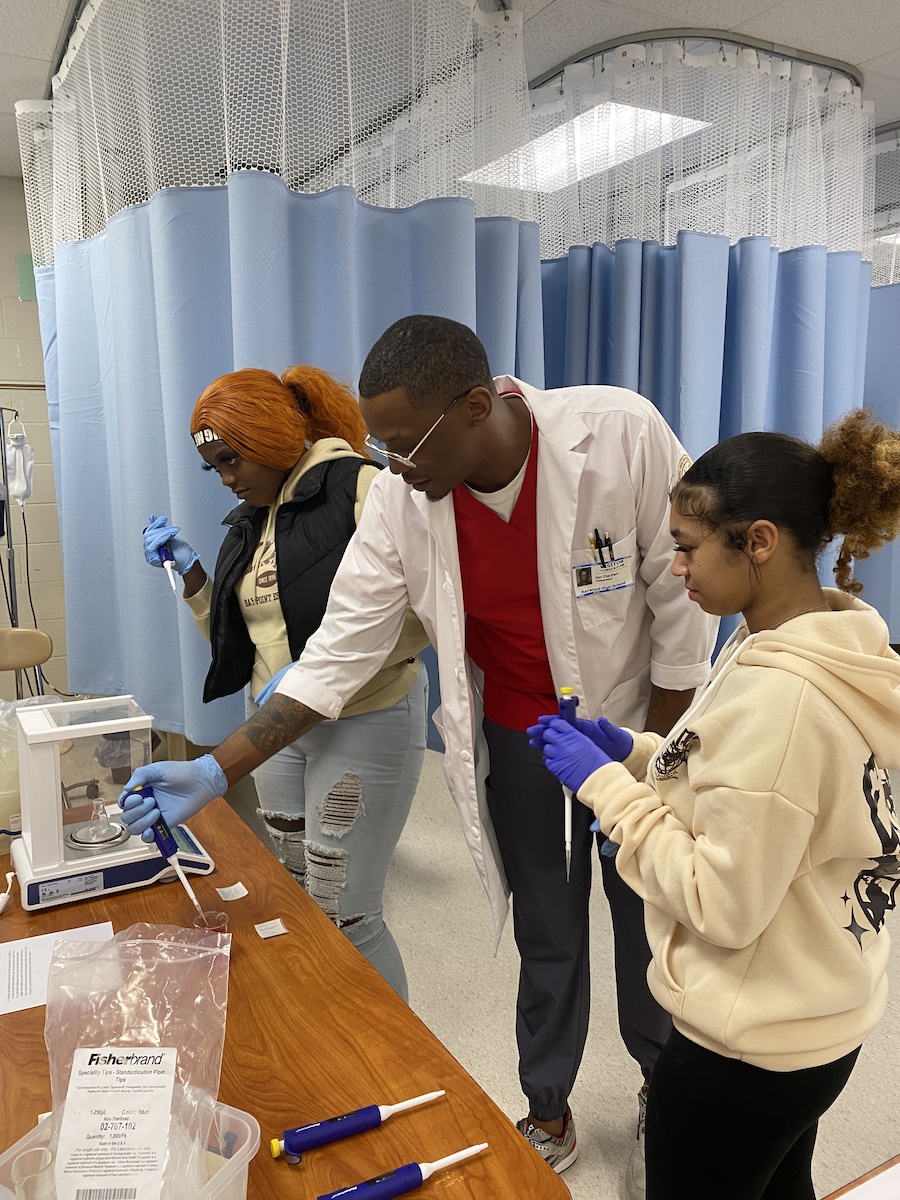APSU professor spreading the MLS gospel in Montgomery County
By: Colby Wilson February 28, 2024

Photo: Dr. Heather Phillips, APSU’s director of laboratory testing and assistant professor of medical laboratory science (MLS), gives a demonstration of the field for local students.
CLARKSVILLE, Tenn. - Numerous medical fields face troubling staffing needs, including medical laboratory scientists (MLS). According to Dr. Heather Phillips of Austin Peay State University’s Department of Allied Health Sciences, MLS personnel play a vital role that is overlooked and often unknown.
"MLS interpret lab results that inform 70-85% of doctors' diagnoses, yet less than 2% of people understand what they do,” she said. “We are all science, all the time. We are translating the information that we get from our testing into medical information used for diagnostic purposes, and we're one of few areas of the hospital that does that."

Photo: Representatives from APSU’s medical laboratory science program provide an overview of the different roles in a lab for local high school students.
Realizing the impact of misperceptions, Phillips has spearheaded an MLS awareness and recruiting program, which she’s bringing straight to the people who need it - students, the future of the field. Hoping to showcase realities within the work, Phillips leads lively MLS presentations and demos at local high schools in the Clarksville-Montgomery County area.
"We talk about diagnostic microbiology, clinical chemistry, hematology, some immunology,” she said. “We talk about all the infectious microbes, parasites, gonorrhea, chlamydia and HIV, and all that fun stuff - things that are going to interest teenagers.”
However, Phillips said the real work is getting students to understand that there’s more to healthcare than what they’ve been led to believe.

“If you have an interest in science and want to work in healthcare, you don’t have to become a nurse or a doctor,” she said. “There’s a real need, now and in the future, for people to do this kind of work because there are so many staffing vacancies.”
The average $37 per hour MLS starting salary also catches teens' attention, as does the nearly 100% hiring rate for Austin Peay graduates due to the lack of qualified applicants for the roles.
Surveying pupils before and after each talk, Phillips has documented substantially more interest once the basics of indispensable MLS tasks get clarified and brought to life. But universally, she finds almost no initial MLS awareness.
"Out of about 180 participants, only one person knew what MLS was,” Phillips said. “And that person had a parent who was a nurse and talked about taking things down to the lab."
That unfamiliarity vanishes as specifics of the overlooked diagnostics occupation come into focus. Enrollment numbers reflect the impact of Phillips’ work as well, with Austin Peay's MLS program doubling last year.
In an age of deep healthcare strains, the visits also equip students to advocate for qualified staff in their own care. Phillips already received word of a student declining an unlicensed X-ray tech's imaging offer, asking instead for "somebody who knows what they're doing."
Amid staffing shortages, healthcare state licensures are being cut or altered, which allows for less qualified individuals to perform healthcare services. Empowering youth to be their own advocates for quality care is an uplifting signal amid the lingering crunches. It also gives students a better understanding of how doctors, nurses and professionals in health sciences work together in a hospital setting and make informed decisions for a patient.
While systemic solutions remain vital long-term, Phillips sees ample reason for optimism. Contacting the next generation fosters interest in a little-known yet vital medical occupation where each new MLS scientist markedly strengthens community health. Opening teens' eyes early empowers their personal health decisions for years to come and sparks passion for saving lives through science.